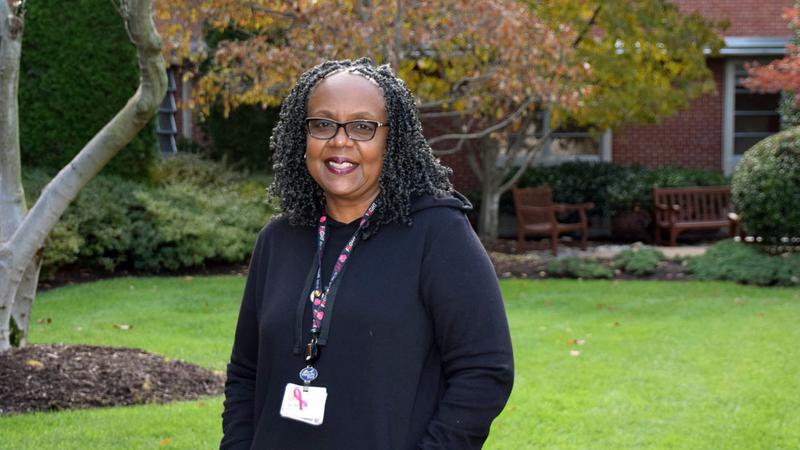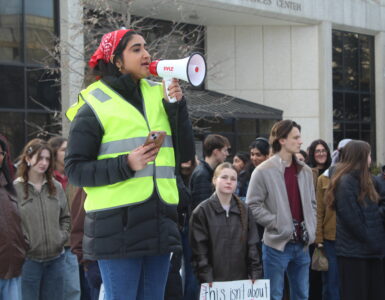The MedStar Washington Hospital Center continues to promote its “Colon Cancer Prevention in the Neighborhood” program, an initiative to expand preventive health in Ward 5 and the surrounding areas, where Black residents demonstrate high rates of advanced colon cancer.
Colon cancer screenings are vital for early detection and preventing further advancement of the disease. But a diverse range of barriers prevent many Ward 5 residents from actively screening for colon cancer, despite many patients having health insurance when they were diagnosed.
Dr. David Shocket leads the screening initiative, which has been around since 2016.
Under the Affordable Care Act, a lot of people do have access to screening, but they don’t use their insurance, Shocket said. “Part of it is pure procrastination. Part of it is they’re afraid of the test. Part of it is, particularly in African American men, there’s this sense of resistance.”
A colonoscopy is a procedure through which a long, thin, flexible tube with a video camera on one end is inserted via the rectum into an individual’s large intestine to look for signs of swelling, inflammation, polyps, or cancerous growths.
The “resistance” to which Shocket is referring are cultural norms surrounding masculinity, which may feel threatened when men consider getting a colonoscopy.
Compared to having a colonoscopy performed, Shocket said that the fecal immunochemical test, or FIT test, is easy, since it is a test that can be performed at home.
The program uses community navigators, individuals from the very communities they serve, who work to educate community members about the importance of colon cancer screenings.
“We’re not here to twist any arms, we’re about educating,” Shocket said. “And it’s part[ly] fear of the unknown; people don’t realize what the test involves…You don’t wait until you have symptoms. This is something you want to do when you’re asymptomatic, before a tumor or cancer develops.”

As for the causes of high incidences of colon cancer, Dr. Shocket says, “It’s almost certainly multifactorial. There’s a strong genetic component with colon cancer. There are environmental factors. There are issues in terms of seeking medical attention. So, it’s all of these going together.”
Shocket noted that there “are clearly disparities in terms of screening for colon cancer. There’s no question about that. When you look at multiple studies, it has to do a lot with access, and so we’re trying to increase access to care by going out in the community.”
Expanding the program means improving access. Since the program launched, it has become a large, joint effort, which has helped it to thrive.
Dr. Jennifer Tran, a colleague of Shocket, received a grant from the D.C. Department of Health to increase colon cancer screening at MedStar’s Washington Hospital Center primary care clinic.
And the Silverman Foundation awarded MedStar’s colorectal surgeons with a grant, which was used to hire two nurse navigators to help facilitate the screenings.
Community navigator Lynel McFadden is a veteran of the screening program in more ways than one. A breast cancer survivor and resident of Ward 5, she knows her community well and understands the concerns, reservations, and needs of her local community. Despite her community’s worries about the fears and discomfort of getting preventive care for colon cancer, she understands the importance of screening.
“I use the breast cancer card,” McFadden laughed. “I use the card that – I’ve been through it. I’ve been through cancer, I’ve survived it, and I’ve educated myself, and I want to help you with that,” she said.
“I’ll talk about screening and talk about the importance of screening. I didn’t have colon cancer. I had cancer, but I talked about the importance of screening because, had I not filed my cancer early, I wouldn’t be talking to you today, because I had breast cancer. So, that’s why screening is important.”

McFadden said she knows the community’s reservations about getting colonoscopies, but she added that screening is “something that we have to do if we want to stay alive.”
Due to its early success, the “Colon Cancer Prevention in the Neighborhood” program was recognized in October 2016 as part of then-Vice President Joe Biden’s Cancer Moonshot Initiative.
Through a $675,000 grant from the Cigna Health Foundation and substantial donations from grateful patients, Ward 5’s colon cancer screening initiative is expected to at least continue for the next three years. Shocket hopes to continue expanding the program to eventually incorporate Wards 7 and 8, which he says have a “tremendous need for colon cancer screening.”















Add comment